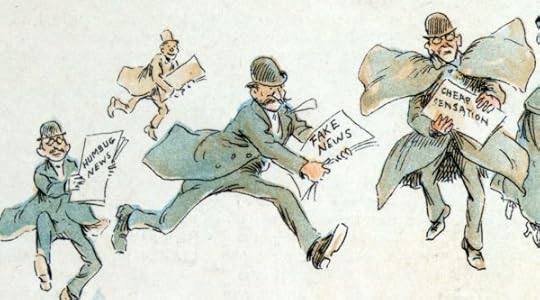The Questions To Ask About The News
On Tuesdays I write about the top voted question on Ask Berkun (see the lovely archive). This week’s question came via email from S.P.:
I often feel overwhelmed by the news I read. How can I better manage my responses?
The news is of course defined by what is new, but the implication has always been that somehow we are informed about the world by consuming “the news” and good citizens are informed ones. Yet as news shifted in the 1970s from being a public service to a business, the organizations that provide it had new preferences for what to share, and how to share it. Neil Postman wrote, “I do not mean to imply that… news deliberately aims to deprive Americans of a coherent, contextual understanding of their world. I mean to say that when news is packaged as entertainment, that is the inevitable result.”
Of course, we are more upset or fearful than entertained when we hear of another school shooting or violent crime, but the reasons why it is chosen are similar. It’s the power of drawing attention that drives media as a business and it’s easier to gain attention for negative reasons than for happier ones. For example, the top trending story will never be “mostly the world, and your neighborhood, is doing better than, or the same as it was yesterday” despite how often this is true, since it’s not a dramatic story. In a sense, it’s not considered newsworthy even if it’s more important to know than the most recent homicide (or all of the “new” things that happened that week). This alone makes news a distortion of reality that is hard for many to notice. Some news sources are more balanced than others, but the news is never neutral. News has an obsession with the immediate present and your life should not.
More profoundly, when a report of a homicide headlines the news, we tend to assume crime is worse. If the crime were in a nearby neighborhood, we might be less likely to visit wherever the crime occurred, or may even avoid going out into public at all. But in reality, the crime rate in that area might be the same as it has been for years, or even be at an all-time low, but the constant news about it shapes our perception more than the reality. Put another way, the individual incident can’t tell you anything about what the trends are. And it follows that an individual news story can’t likely tell you much about the context either. It’s common for no context to be offered or possible trends mentioned. We mostly consume microunits of news, headlines and skimmable paragraphs, free of any greater meaning or information to help us put the “news” into a coherent world view that would actually make us more informed.
The top news event on any given day can mean one of two things:
Something important and profound with lasting consequences may have happened
Something that easily draws attention but has little substance on any trend changing occurred
Reporters often take the stance that they can’t know which one is right for a particular event since it just happened. They would claim that it’s only over time that hindsight lets us understand what really happened and to see which events signified real change. Sometimes that’s true, but that suggests we’d all be better off reading the news once a week, when journalists have made more sense of what happened and have a thoughtful context to offer. But we crave novelty, and media businesses thrive on providing it. Few of us have the self-control to resist the ways media tempts us to consume right now.
But even when reading breaking news, there are simple questions that, if asked, help put the top news of the day into a context that helps us be truly informed. These questions include:
What is the source? Who paid for this to be written?
What assumptions are you confirming are true, but aren’t in this news itself (see confirmation bias)?
Why did this get your attention? What feeling did it generate? Did reading/hearing more than just the headline change that feeling?
Is there another story from an equally reputable source that puts this news in a different context?
How is this event any different from the last time an event like it occurred?
What pattern, if any, does this event form with similar ones over the last week/month/year/decade/century?
Does this event fit, or is an outlier, to the primary accepted theories for what is happening in this field/city/community/profession?
What alternative explanations or meanings can this event signify (including the possibility that the event alone signifies nothing)?
How many other similarly probable events occurred today? Or occur each year?
What other questions should we be asking of the news we read? Leave a comment with suggestions. Thanks.




